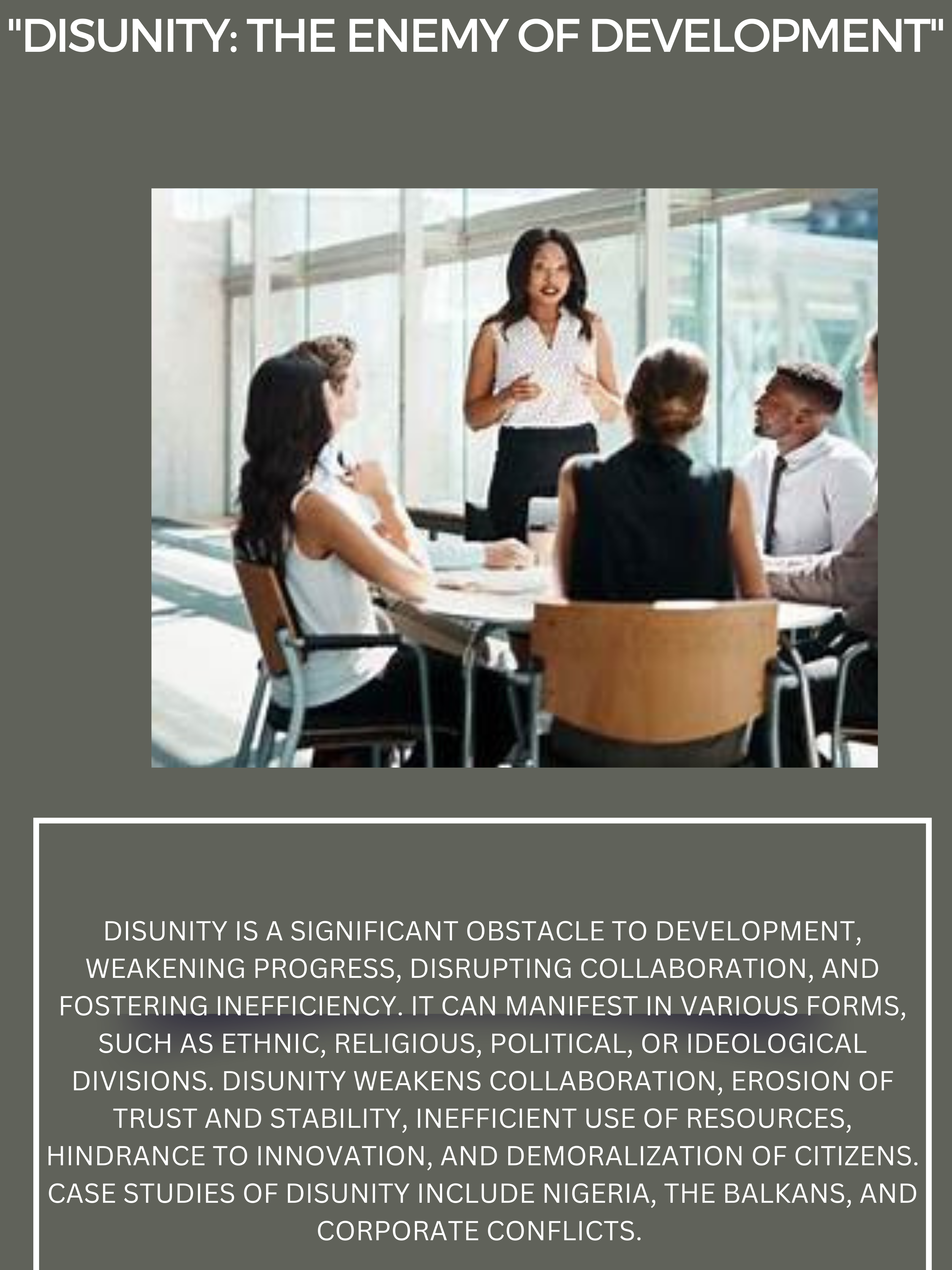
DISUNITY THE ENEMY OF DEVELOPMENT
Disunity is a significant obstacle to development, both at the individual and collective levels. It weakens the foundation of progress, disrupts collaboration, and fosters inefficiency. Whether in families, organizations, or nations, the absence of unity can hinder growth and derail efforts toward a common goal. This article explores the concept of disunity, its detrimental effects on development, and the importance of fostering unity to achieve sustainable progress.
Understanding Disunity
Disunity refers to the lack of cohesion, agreement, or harmony among individuals or groups. It manifests in various forms, such as divisions along ethnic, religious, political, or ideological lines. Disunity can stem from misunderstandings, conflicting interests, prejudice, selfishness, or a lack of effective communication.
At the core of disunity lies the inability to prioritize collective well-being over individual or sectional interests. When people fail to recognize the value of working together, progress becomes fragmented, and the energy that could have been directed toward development is instead wasted on conflicts and disagreements.
Disunity and Its Impact on Development:
1. Weakening Collaborative Efforts
Progress requires collaboration. Whether in a community or a nation, individuals must pool their resources, skills, and ideas to achieve common goals. Disunity disrupts this synergy, creating a scenario where resources are squandered on duplicative efforts or counterproductive competition. For example, in nations plagued by tribalism or partisan politics, development projects often become tools for division rather than platforms for collective advancement.
2. Erosion of Trust and Stability
Unity fosters trust, which is a cornerstone of stability. In contrast, disunity breeds suspicion and undermines social cohesion. A society divided by distrust is more prone to unrest, violence, and instability, which scare away investors and disrupt economic activities. Political disunity, for instance, often leads to policy inconsistency, deterring both local and foreign investments that are critical for development.
3. Inefficient Use of Resources
Disunity often results in a lack of coordination, leading to inefficient resource allocation. Resources that could have been used to build infrastructure, improve healthcare, or boost education are instead diverted to resolve conflicts or placate divided factions. In extreme cases, disunity leads to civil wars, which deplete resources and leave long-lasting scars on the affected regions.
4. Hindrance to Innovation
Innovation thrives in environments where diverse perspectives come together to create solutions. Disunity stifles this process by fostering segregation and limiting opportunities for constructive dialogue. When people refuse to collaborate due to differences, the potential for groundbreaking ideas is lost.
5. Demoralization of Citizens
Disunity demoralizes citizens, as they feel disconnected from collective goals. This sense of alienation reduces participation in community or national development initiatives, further slowing progress. In divided societies, individuals often prioritize their subgroup's interests over the larger community, creating a cycle of stagnation.
Case Studies of Disunity and Its Consequences:
1. Nigeria
Nigeria, often referred to as the "Giant of Africa," is a classic example of a country struggling with disunity. Ethnic and religious divisions have hindered the nation’s development for decades. Despite abundant natural resources, the lack of unity among its diverse population has resulted in corruption, poor governance, and a lack of cohesive national policies.
2. The Balkans
The Balkan region in Europe has experienced numerous conflicts due to disunity among ethnic groups. The wars in the 1990s not only caused immense human suffering but also set back economic and social development by decades. Rebuilding the region required extensive international intervention and cooperation among the divided groups.
3. Corporate Disunity
Even in the corporate world, disunity among team members can be detrimental. Companies plagued by internal conflicts often experience lower productivity, high employee turnover, and reduced profitability. For instance, businesses that fail to unite their workforce around shared goals struggle to adapt to market changes and lose their competitive edge.
The Importance of Unity for Development:
1. Collective Strength
Unity harnesses the collective strength of individuals, allowing them to overcome challenges that would be insurmountable on their own. When people work together, they can achieve remarkable feats in infrastructure, technology, healthcare, and education.
2. Enhanced Problem-Solving
Unity encourages diverse perspectives to come together, fostering innovation and effective problem-solving. It creates an environment where individuals feel valued and are more willing to contribute their skills and ideas.
3. Sustainable Growth
Development achieved through unity is more likely to be sustainable. When people feel a sense of ownership and responsibility for collective progress, they are more committed to maintaining and improving their achievements.
4. Peace and Stability
Unity fosters peace, which is a prerequisite for development. Stable societies are better positioned to attract investments, implement long-term policies, and ensure the well-being of their citizens.
Steps Toward Building Unity:
1. Promoting Inclusive Leadership
Leaders must prioritize inclusivity, ensuring that all groups feel represented and valued. This helps to bridge divides and fosters a sense of belonging among diverse populations.
2. Encouraging Open Dialogue
Effective communication is key to resolving misunderstandings and building trust. Platforms for open dialogue should be created to allow individuals and groups to express their concerns and collaborate on solutions.
3. Educating for Unity
Education systems should emphasize the importance of unity and teach students to appreciate diversity. This helps to nurture a generation that values collaboration over division.
4. Celebrating Shared Values
Highlighting shared values, goals, and achievements can foster a sense of unity. By focusing on what unites rather than divides, communities and nations can build stronger bonds.
5. Addressing Inequities
Disparities in wealth, opportunities, and treatment often fuel disunity. Efforts must be made to create a more equitable society where everyone has a fair chance to succeed.
In conclusion,disunity is undoubtedly the enemy of development. It fractures societies, wastes resources, and stifles progress. To achieve sustainable development, individuals, organizations, and nations must prioritize unity, embracing diversity as a strength rather than a weakness. Only by working together can we overcome the challenges of our time and build a future marked by prosperity,
peace, and progress. The path to development is not through division, but through unity.



0 COMMENTS